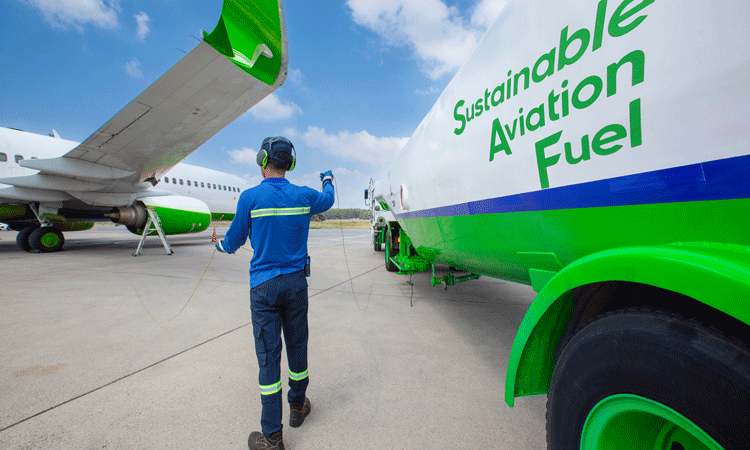Africa takes flight: Turning waste into green skies
Posted: 5 November 2025 | Furkan Özdemir | No comments yet
Africa has the resources to fuel a greener future. Furkan Özdemir, Aviation Lecturer at Atilim University, explores how local innovation and smart policy could help the continent turn waste into sustainable aviation fuel.


One thing is becoming increasingly evident when discussing the future of aviation: sustainable aviation fuel (SAF) is no longer an option; it is a necessity. Airlines worldwide are under increasing pressure to reduce their carbon emissions. SAF has become a viable option for reducing the carbon footprint of air travel. The story gets more complicated when it comes to Africa, though.
Is it realistic for a continent with little money, poor infrastructure and big economic differences to take part in this green revolution? The answer is complicated, but hopeful.
The cost conundrum
Let’s start with the numbers. Making SAF is still expensive. Biofuel-based SAF costs about €1,461 per tonne in Europe, while e-fuels can cost up to €7,695 per tonne, which is three to five times more than regular jet fuel. Things are even more complex in Africa. Prices increase further due to higher financing costs, as well as taxes, logistics and import costs. Waste-based SAF can cost twice as much as regular jet fuel, and synthetic fuels produced through carbon capture technologies can cost six to ten times as much.
Join us live: Shaping the Next Generation of Hold Baggage and Air Cargo Screening
Join us live for an insightful webinar on 11th December at 14:00 GMT, in collaboration with Smiths Detection, as we explore the strategic balance of operational efficiency, regulatory compliance, and sustainability in high-volume security environments.
This session offers a focused look into future-proofing your security strategy.
Key learning points
- Cost Reduction: Strategies to minimize bag travel time while simultaneously reducing operational costs.
- Regulatory Roadmap: Insights into the next wave of regulatory changes and their impact on future investment decisions.
- Sustainable Systems: Practical approaches to building sustainability into security systems and lowering the total cost of ownership (TCO).
- Scalable Solutions: Real-world examples of scalable systems supporting current airport growth and preparing for tomorrow.
Register now for expert insights, case studies, and actionable strategies on operational efficiency!
The cost barrier isn’t just a money problem; it’s also a strategic one. African airlines that fly to other countries must follow rules that are becoming increasingly stringent regarding the reduction of carbon emissions. If you don’t do this, you may not be able to access profitable international routes and partnerships. This is not a threat that is far away; it is happening right now. Airlines that fail to prioritise SAF could fall behind as the world transitions to more environmentally friendly flying.
The untapped potential of Africa
The good news is that Africa is not without chances. Several countries are well-positioned to produce SAF by utilising local feedstocks and other agricultural resources they already possess.
South Africa could produce between 3.2 and 4.5 billion litres of biofuels annually from leftover sugarcane and biomass from invasive plants. This potential could turn South Africa into a regional SAF hub, serving both the domestic and international aviation markets.
Kenya aims to increase its SAF blend to 10% by 2030, positioning it as a leader in sustainable aviation in East Africa. Ethiopia and Nigeria are exploring pilot projects that utilise local feedstocks to incorporate SAF into their national aviation plans.
Africa has an advantage because it has a significant amount of biomass and can produce SAF with minimal adverse environmental impacts. Unlike regions that rely heavily on energy-intensive synthetic fuels, Africa can produce SAF from materials that are already available, often considered waste, thereby reducing both carbon emissions and production costs.
The function of policy and funding
Potential by itself is not enough. SAF projects require funding – and borrowing money in Africa costs approximately 30% more than it does in other parts of the world. This makes SAF less appealing to investors from a financial perspective. Private sector initiatives may fail to grow if there are no policies in place to support them.
SAF projects require funding – and borrowing money in Africa costs approximately 30% more than it does in other parts of the world.
This is where carbon markets and public private partnerships (PPPs) play a crucial role. Carbon credits from using SAF can help offset production costs, making it more appealing for both investors and airlines to get involved. There are also international climate finance programmes, such as the Green Climate Fund or the World Bank’s sustainability initiatives, that can help you secure funding.
Policymakers can also utilise tax breaks, subsidies and blending mandates to encourage people to produce and utilise SAF. Governments show that SAF is a priority by making clear rules for both domestic and international stakeholders. This is more than just an environmental policy; it’s an economic strategy. Countries that act quickly can become SAF leaders in their region.


Suggestions for strategy
What should Africa do next? The plan needs to be phased, thought out and realistic:
Start small: Begin with pilot projects using low percentage SAF blends to assess their effectiveness and refine the production process.
Utilise local feedstocks: Utilise inexpensive, abundant materials such as agricultural waste, sugarcane byproducts, and invasive plant species.
Invest in infrastructure: Build refineries, storage facilities and distribution networks that can effectively handle SAF.
Engage carbon markets: Utilise carbon credits to generate revenue from reducing emissions and make SAF more competitive.
Encourage international co-operation: Collaborate with airlines, investors and technical experts to exchange information and secure funding.
Following these steps will help Africa slowly adopt SAF, making it a scalable and profitable option.
Why Africa needs to act now
Time is running out. The aviation industry is working hard to reach net zero emissions by 2050. Airlines that don’t use SAF could lose access to international routes, partnerships and revenue streams.
For Africa, acting early has many advantages:
Environmental leadership: By reducing carbon emissions, Africa is taking an active role in global efforts to protect the environment.
Economic opportunity: Building SAF infrastructure can create jobs, boost local economies, and set up a supply chain in the area.
Strategic advantage: Countries that start producing SAF can sell it to international airlines, which will generate revenue and establish them as key partners in green aviation.
Africa’s unique strengths, including its large biomass reserves, relatively untapped resources, and growing aviation market, mean that the continent could set a new standard for sustainable aviation.
Conclusion
For Africa, sustainable aviation fuel presents both opportunities and challenges. It’s challenging to obtain money, and the cost of production is high. Africa can turn these problems into competitive advantages however, with careful planning, effective policies, and collaboration with other countries.
African countries can not only make their skies greener, but they can also become leaders in the global SAF market by starting small, utilising local resources, and incorporating carbon markets into the mix. It won’t be easy to get there. It will take money, vision and determination. But for Africa, the sky isn’t the limit; it’s the opportunity.


Stay Connected with International Airport Review — Subscribe for Free!
Get exclusive access to the latest airport and aviation industry insights from International Airport Review — tailored to your interests.
✅ Expert-Led Webinars – Gain insights from global aviation leaders
✅ Weekly News & Reports – Airport innovation, thought leadership, and industry trends
✅ Exclusive Industry Insights – Discover cutting-edge technologies shaping the future of air travel
✅ International Airport Summit – Join our flagship event to network with industry leaders and explore the latest advancements
Choose the updates that matter most to you.
Sign up now to stay informed, inspired, and connected — all for free!
Thank you for being part of our aviation community. Let’s keep shaping the future of airports together!
Related topics
Emissions, Funding and finance, Regulation and Legislation, Sustainability, Sustainable Aviation Fuel (SAF)

















